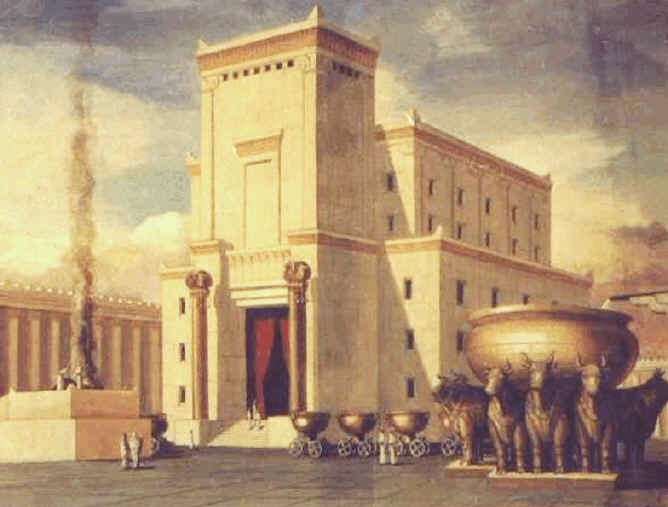(Children’s Songbook, 158)
This lesson can be summed up in two words. Guess the letters to find the two mystery words. (chalk)

Peer pressure is the influence you and your friends
have on one another.
Peer pressure can be negative or positive.
Today's lesson from the Old Testament:
Today you will learn about a king who was influenced by negative peer pressure and the consequences he suffered as a result of his decisions.
 |
| When Solomon was told by the Lord he could ask for anything, he asked for wisdom. |
After Solomon died and Rehoboam became king, what did the people want him to do for them? (1 Kings 12:3–4.)
 |
| King Solomon built a beautiful temple. |
7 And they spake unto him, saying, If thou wilt be a servant unto this people this day, and wilt serve them, and answer them, and speak good words to them, then they will be thy servants for ever.
What was their advice to Rehoboam? (1 Kings 12:11)
They advised him to tell the people, " 11 And now whereas my father did lade you with a heavy yoke, I will add to your yoke: my father hath chastised you with whips, but I will chastise you with scorpions."
Why do you think Rehoboam decided to follow the advice of the younger men rather than the older men?
How do you think the people felt about Rehoboam’s decision? What are some of the consequences of being unkind to others?
What was the result of Rehoboam following the advice of his young friends instead of the wiser old men? (1 Kings 12:19–21.)
 |
| REHOBOAM AND JEROBOAM |
 |
| This is how the twelve tribes of Israel became divided into two kingdoms, the kingdom of Judah (Rehoboam) and the kingdom of Israel (Jeroboam). |
WHAT WOULD YOU DO IF. . .
http://www.classtools.net/random-name-picker/17_ZgR58k
- a. You have a friend who often asks you to skip school and spend the day playing. How could you be a positive influence on your friend?
- b. You are staying the night at a friend’s house. Every night before getting into bed you kneel down and say your prayers, but you know your friend does not have that habit. What could you do when it is time to say your prayers?
- c. A group of your friends wants you to go to a movie with them. You know that your parents consider the movie to be inappropriate, but your friends beg you to go. How could you be a positive influence on your friends?
- d. You want to go to church on Sundays, but some friends want you to stay home and play soccer with them. How could you be a positive influence on your friends?
- e. You have a friend who wants you to go with her to help a widow who lives down the street. You would rather play. What should you do? Why?
QUESTIONS:
• Why should we seek counsel from wise people?
• Why is it important to choose friends with wholesome values?
• What should we do if someone tries to persuade us to do something we know is wrong?
• How does negative peer pressure have a bad influence on some young people today?
• How can we benefit from positive peer pressure?
• How can we use positive peer pressure to help other young people?
• Why is it important to choose friends with wholesome values?
• What should we do if someone tries to persuade us to do something we know is wrong?
• How does negative peer pressure have a bad influence on some young people today?
• How can we benefit from positive peer pressure?
• How can we use positive peer pressure to help other young people?
LEARN A SCRIPTURE
MORONI 7: - 13 But behold, that which is of God inviteth and enticeth to
- do good continually; wherefore, every thing which inviteth
- and enticeth to do good, and to love God, and to serve him,
- is inspired of God.

















